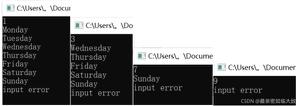在C和C ++中调用未声明的函数
在C中:
下面是C中的示例,
#include <stdio.h>//没有提到参数列表
void func();
int main(){
//它在C中编译,但这不是
//我们应该做的事情
func(10);
return 0;
}
void func(int x)
{
printf("value: %d\n", x);
}
输出:
value: 10
上面的一个成功编译。但是下面的代码不能在C中编译。
#include <stdio.h>//没有提到参数列表
void func();
int main(){
//它不会编译
func('a');
return 0;
}
void func(char x)
{
printf("value: %c\n", x);
}
输出:
main.c:14:6: error: conflicting types for ‘func’void func(char x)
^~~~
main.c:15:1: note: an argument type that has a default promotion can’t match an empty parameter name list declaration
{
^
main.c:4:6: note: previous declaration of ‘func’ was here
void func();
^~~~
在C ++中:
下面是C ++中的示例,
#include <bits/stdc++.h>using namespace std;
//没有提到参数列表
void func();
int main(){
//它不会编译
func(10);
return 0;
}
void func(int x)
{
cout << "value: \n" << x << endl;
}
输出:
main.cpp: In function ‘int main()’:main.cpp:10:12: error: too many arguments to function ‘void func()’
func(10);
^
main.cpp:5:6: note: declared here
void func();
^~~~
以上是 在C和C ++中调用未声明的函数 的全部内容, 来源链接: utcz.com/z/326413.html





